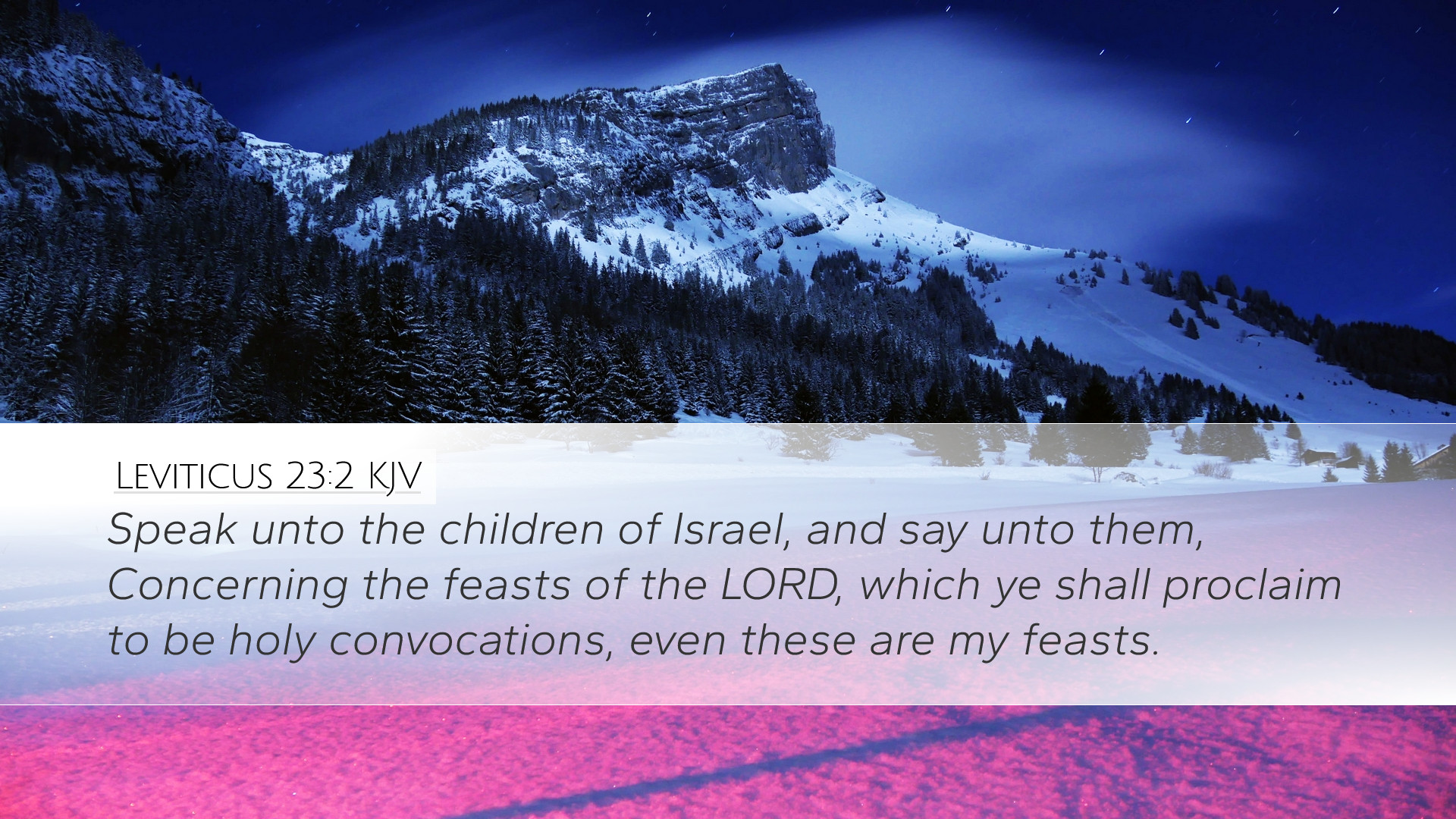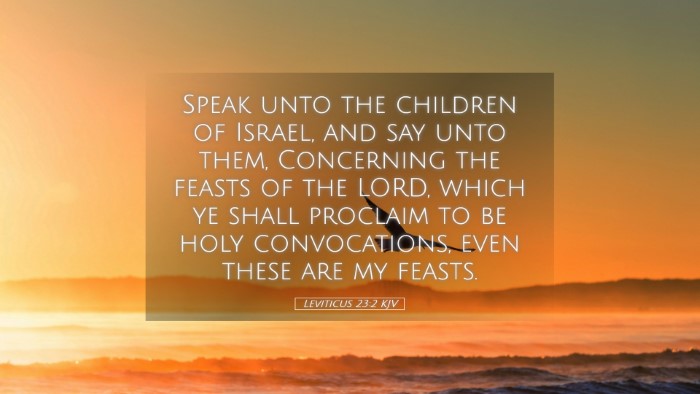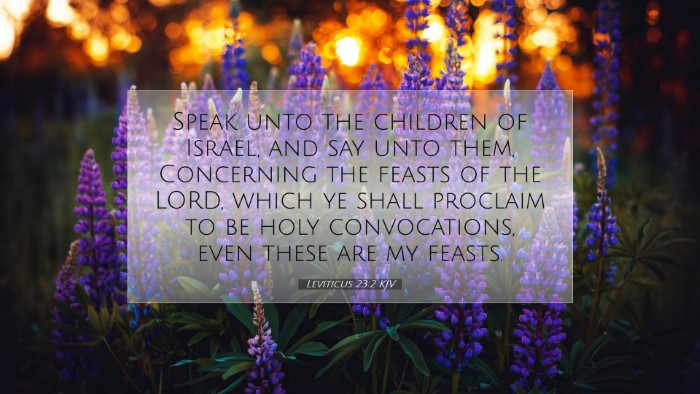Commentary on Leviticus 23:2
Leviticus 23:2 states: "Speak unto the children of Israel, and say unto them, concerning the feasts of the Lord, which ye shall proclaim to be holy convocations, even these are my feasts." This verse serves as an introduction to the detailed regulations regarding the various feasts that the Israelites were to observe, framing them as divinely ordained occasions for worship and reflection.
General Overview
This verse emphasizes the significance of ritual observance in the life of Israel, showcasing God's desire for His people to maintain a rhythmic practice of worship and remembrance. The designation of these feasts as "my feasts" underscores their sacred nature and divine origin.
The Importance of Communication
Matthew Henry comments on the necessity of clear communication regarding the feasts: "God requires His people to be instructed in His institutions." This is an essential part of the covenant relationship and demonstrates that understanding these festivals is vital to their religious life.
Instruction for the Congregation
Furthermore, the phrase "speak unto the children of Israel" signifies the responsibility of leaders to teach the congregation. Albert Barnes notes, "There is a duty laid upon those in authority to communicate God’s commandments.” Such instruction ensures that the feasts are observed correctly and understood within their intended context.
Feasts as Holy Convocations
In referring to these times as “holy convocations,” the text highlights the gatherings of the community for worship. Adam Clarke elucidates that these convocations represent both a physical assembly and spiritual acknowledgment of God's sovereignty over time and history. He states, "Each feast is a call to stop, reflect, and honor the Lord."
Spiritual Significance
These feasts are not mere historical remembrances; they are rich in spiritual significance, reflecting overarching themes of deliverance, remembrance, and communal identity. Each feast reveals aspects of God’s character and the covenantal relationship He desires with His people.
Identifying God’s Feasts
The phrase "these are my feasts" carries weighty theological implications. The feasts belong to God; they are initiated by Him and serve as a means for His people to encounter and respond to Him. Barnes underscores that this declaration establishes the authority and the exclusivity of these times, providing boundaries for Israel's worship practices.
Exclusivity of Worship
The specification of "my feasts" delineates the worship of Yahweh from surrounding pagan practices, which often included rituals driven by hyper-social or economic motives. Thus, God is setting apart his people, calling them to a different ethos centered in worship and gratitude.
Covenantal Relationship
The feasts act as a demonstration of God’s ongoing relationship with Israel, characterized by love and commitment. Matthew Henry states that the observance of these times of worship is a reflection of their ongoing covenant and a way to remember God's past faithfulness while looking forward to His future provision.
Reminders of God’s Deliverance
Every feast tied back to significant historical events, such as the Passover recalling deliverance from Egypt, serves as a continual reminder of God’s saving acts throughout history. Adam Clarke notes that “each feast represents a milestone in salvation history, thus rooting the faith of the Israelites in experience and covenantal promise.”
Observance and Community
Engaging in these holy convocations fosters community among the Israelites. Participating together in worship deepens the sense of identity and belonging. This commonality of faith and shared experience reinforces not just individual faith but communal allegiance to the covenant with God.
Encouragement Toward Faithfulness
These gatherings are not just for remembrance but are also calls to action. Observers are reminded to remain faithful to their commitments to God and one another. In the words of Barnes, "These convocations serve as a means to edify the people and encourage them unto a deeper loyalty to God."
Theological Reflections
The study of these feasts in the context of Leviticus 23:2 brings forth powerful theological insights for today’s believers:
- Divine Sovereignty: This text reinforces the sovereignty of God in prescribing how worship should be conducted.
- Covenantal Memory: It illustrates the importance of remembering and practicing the foundational aspects of faith.
- Community and Fellowship: It highlights the necessity of communal worship in strengthening the body of believers.
- Liturgical Rhythm: It promotes the idea that worship should have a rhythm that incorporates both celebration and reflection.
Application for Modern Believers
Contemporary Christians can draw several lessons from Leviticus 23:2:
- Importance of Teaching: Just as the Israelites were instructed in observing God’s feasts, churches today must prioritize teaching their congregations regarding worship and doctrine.
- Gathering for Worship: Emphasizing community gatherings that focus on God’s presence is essential for spiritual health.
- Remembering Salvation: Regularly reflecting on the acts of God through communal worship can renew faith and empower believers to share the Gospel.
Conclusion
Leviticus 23:2 is a pivotal verse that encapsulates the essence of worship in Israel's faith. By recognizing these feasts as God’s ordained times for remembrance and celebration, believers can appreciate their significance both historically and in contemporary worship practices. The call to gather, reflect, and honor God through these observances resonates with the roots of faith and encourages a continuous exploration of God’s holiness and grace in community.


